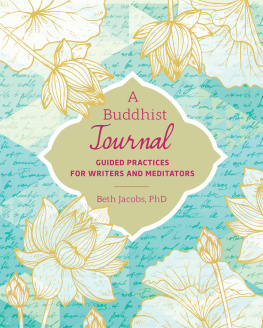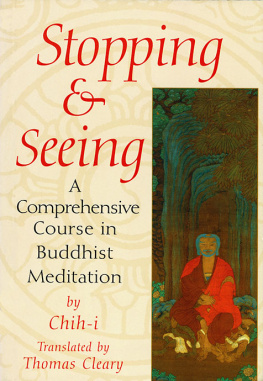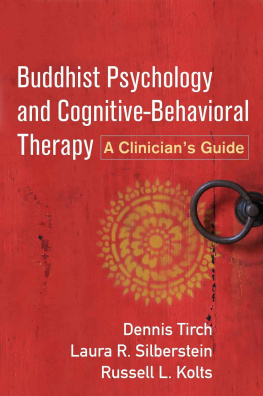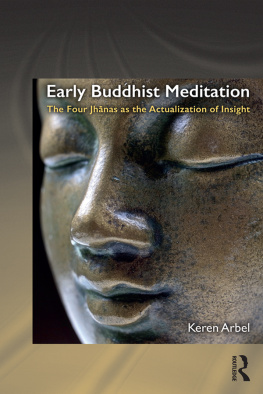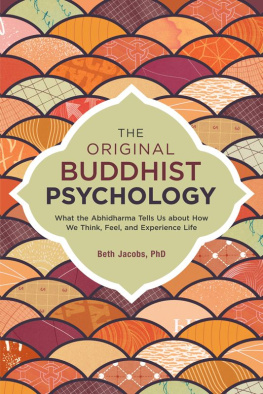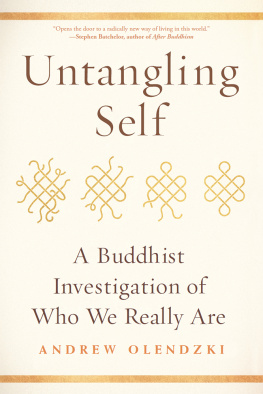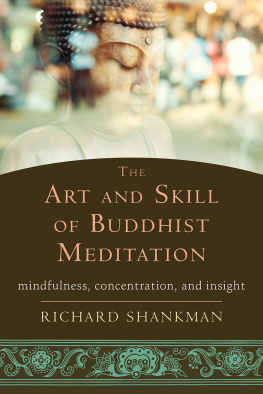
Praise for A Buddhist Journal
In this kaleidoscopic invitation to unfolding, whether on the cushion or with the pen, Beth Jacobs has written the book that I wish had been available when I began teaching journaling in meditation programs. Honoring the roots and branches of both meditation and expressive writing, paying homage to the lineage and integrity of each, this work offers the exercises that expand, deepen, and integrate the practices. It is an offering of rich illumination and wisdom.
Deborah Ross, LPC; certified journal therapist; and coauthor, with Kathleen Adams, of Your Brain on Ink
A Buddhist Journal is a wonderful guide to writing more deeply and living from the heart. Beth Jacobs offers insightful commentary along with writing exercises that lead one to directly experience some of the basic teachings of Buddhism. Words can sometimes point toward experience that goes beyond words that is infinite and unknowable. Im reminded of a Buddhist nun who described her meditation practice as a letting go of the clenched fist of the mind to fall into everything. This book will nourish the creativity of any writer, Buddhist or not.
James Janko, author of The Clubhouse Thief and Buffalo Boy and Geronimo
Copyright 2018 by Beth Jacobs. All rights reserved. No portion of this book, except for brief review, may be reproduced, stored in a retrieval system, or transmitted in any form or by any meanselectronic, mechanical, photocopying, recording, or otherwisewithout the written permission of the publisher. For information contact North Atlantic Books.
Published by
North Atlantic Books
Berkeley, California
Cover design by Jasmine Hromjak
Book design by Happenstance Type-O-Rama
Printed in Canada
A Buddhist Journal: Guided Practices for Writers and Meditators is sponsored and published by the Society for the Study of Native Arts and Sciences (dba North Atlantic Books), an educational nonprofit based in Berkeley, California, that collaborates with partners to develop cross-cultural perspectives, nurture holistic views of art, science, the humanities, and healing, and seed personal and global transformation by publishing work on the relationship of body, spirit, and nature.
North Atlantic Books publications are available through most bookstores. For further information, visit our website at www.northatlanticbooks.com or call 800-733-3000.
Library of Congress Cataloging-in-Publication data is available from the publisher upon request.
North Atlantic Books is committed to the protection of our environment. We partner with FSC-certified printers using soy-based inks and print on recycled paper whenever possible.
For Clay & TARA
with Avalokiteshvaras light and listening.
Also by Beth Jacobs
- The Original Buddhist Psychology: What the Abhidharma Tells Us about How We Think, Feel, and Experience Life
- Paper Sky: What Happened After Anne Franks Diary Ended
- Writing for Emotional Balance: A Guided Journal to Help You Manage Overwhelming Emotions
Acknowledgments
This book grows out of my own Buddhist practice, deeply imbedded in and indebted to my sangha and root teacher, Sojun Diane Martin Roshi, and our local core group, Joe, Maia, and Sensei Tricia. My writing practice is nourished by a different sangha, the perennials of the National Association of Poetry Therapy, and by my special comrades in art and life, Claire, Cris, Erin, Linda, Nina, Rene, Sally, and Susan. I am thankful to the staff at North Atlantic Books for the best in collaboration. Finally, every moment and word is infused with the love of my family: Rick, my inspiring children, Tara and Clay, and our cat, Zane.
Preface
Why a Writing Practice? The Value of a Guided Journal for Buddhists
There is a common skewed perception that because Buddhism values stillness and silence, there is no place for writing in Buddhist practice. In one article, Norman Fischer ironically calls writing a bad habit for a Zen priest. From one angle, there is a valid question about the use of writing in the context of pervasive impermanence and the search for an awareness unbounded by words.
Yet Buddhism is a prolific writing religion and has produced an exceptional richness of written expression. Some of the rare beauty of Buddhist writing is due to the same reasons given for it being seemingly pointless. Deep experience is beyond words, but writing doesnt just convey information. It causes things to happen, things that change both the writer and the reader forever. In the words of the philosopher, Candrakirti, What hearing and what teaching is there of a Dharma without words? Yet what is without words is taught and heard.
Because Buddhist writing is in the context of a search for deeper truth, the events it tends to inspire are often more surprising and lively than most writing. Buddhist writing is delivered with the condensation of poetry; it startles, suddenly reverses the direction of thought, slams the reader to the mat. Buddhist writing appreciates and manipulates the qualities of language because of its understanding of language itself as a process within a bigger view of the mind.
If language is seen as a creative vehicle of the flow of consciousness, then written language is the vehicles owners manual, roadmap, and tourist souvenir all at once. Writing doesnt just freeze language. It is a particular usage, or many usages. Writing extracts communication from an immediate and bodily interpersonal context. This purifies word usage and intent. But, writing doesnt just transform language into visual symbol and preserve words. Writing turns language into a quiet experience for the recipient, and the experience is different for each reader and each reading.
In this view of language, the process of writing itself is especially alive. As writing expresses an aspect of the mind, it creates another. By turning language into a product, we create a vital partner to our own processing of reality. Our writing and mind are in an echo chamber, affecting each other and providing an infinite regression of mutual influence, or, in Buddhist terms, manifesting interdependent origination. This is why personal writing, or journaling, is so popular and important. It forces a private but essential articulation of vague internal processes, while it allows both intentional and surprising development of those processes.
There are as many ways to be Buddhist as there are practitioners, since each person must internally and individually come to terms with inexpressible truth. In some Buddhist philosophies, this might be called finding a conventional reality within an absolute reality. In a popular usage, this resonates with what is sometimes noted as the Buddhas last words: Be a lamp unto yourself.
This is why Buddhist teachers frequently recommend practice journals for students to augment the awareness that blooms within sitting and studying practices. And this is why a guided journal within a Buddhist practice has such powerful potential. Writing takes the tools we have at hand and uses them to dig in the world that is without a speck of dust.
Section 1
The Formal Practice
Meditation and writing practices are both formal activities that invite freedom. The exercises of meditation, mindfulness training, and personal writing rely on structure and repetition while they court surprise and revelation. All of these processes open awareness because they purposefully leave time and space for the unknown.
Next page
